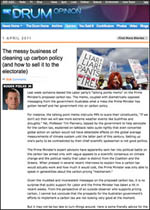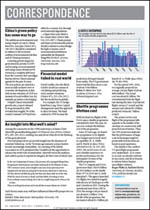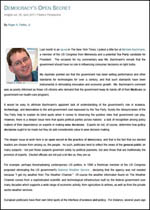Recent PublicationsThe “New” Carbon Economy: What's New?by E. Boyd, M. Boykoff, and P. Newell Introduction: We now have what is commonly called a carbon economy. However, it is in fact made up of several, increasingly inter-connected, carbon markets. It takes different forms in different parts of the world, but includes systems of emissions trading (in the EU, some states in the USA and emerging schemes in cities, such as Montreal), and the buying and selling of offsets through United Nations-controlled “compliance” markets, most notably though the Clean Development Mechanism (CDM) created by the Kyoto Protocol, as well as through “voluntary” markets. The carbon economy has had a turbulent history: its monetary value was affected by global financial meltdown, which also suppressed levels of demand for carbon credits, and its legitimacy questioned amid claims of climate fraud, “toxic carbon”, and acts of (neo)colonial dispossession (Bachram 2004; Friends of the Earth 2009; Lohmann 2005, 2006). |
 |
The Role of the Mediaby M. Boykoff |
Science Student Profile: Why I Picked University of Colorado-Boulder
|
College and University Environmental Programs as a Policy Problem (Part 1): Integrating Knowledge, Education, and Action for a Better World?by S.G. Clark, M.B. Rutherford, M.R. Auer, D.N. Cherney, R.L. Wallace, D.J. Mattson, D.A. Clark, L. Foote, N. Krogman, P. Wilshusen, and T. Steelman Abstract: The environmental sciences/studies movement, with more than 1000 programs at colleges and universities in the United States and Canada, is unified by a common interest—ameliorating environmental problems through empirical enquiry and analytic judgment. Unfortunately, environmental programs have struggled in their efforts to integrate knowledge across disciplines and educate students to become sound problem solvers and leaders. We examine the environmental program movement as a policy problem, looking at overall goals, mapping trends in relation to those goals, identifying the underlying factors contributing to trends, and projecting the future. We argue that despite its shared common interest, the environmental program movement is disparate and fragmented by goal ambiguity, positivistic disciplinary approaches, and poorly rationalized curricula, pedagogies, and educational philosophies. We discuss these challenges and the nature of the changes that are needed in order to overcome them. In a subsequent article (Part 2) we propose specific strategies for improvement. Read more ... |
 |
College and University Environmental Programs as a Policy Problem (Part 2): Strategies for Improvementby S.G. Clark, M.B. Rutherford, M.R. Auer, D.N. Cherney, R.L. Wallace, D.J. Mattson, D.A. Clark, L. Foote, N. Krogman, P. Wilshusen, and T. Steelman Abstract: Environmental studies and environmental sciences programs in American and Canadian colleges and universities seek to ameliorate environmental problems through empirical enquiry and analytic judgment. In a companion article (Part 1) we describe the environmental program movement (EPM) and discuss factors that have hindered its performance. Here, we complete our analysis by proposing strategies for improvement. We recommend that environmental programs re-organize around three principles. First, adopt as an overriding goal the concept of human dignity-defined as freedom and social justice in healthy, sustainable environments. This clear higher-order goal captures the human and environmental aspirations of the EPM and would provide a more coherent direction for the efforts of diverse participants. Second, employ an explicit, genuinely interdisciplinary analytical framework that facilitates the use of multiple methods to investigate and address environmental and social problems in context. Third, develop educational programs and applied experiences that provide students with the technical knowledge, powers of observation, critical thinking skills and management acumen required for them to become effective professionals and leaders. Organizing around these three principles would build unity in the EPM while at the same time capitalizing on the strengths of the many disciplines and diverse local conditions involved. Read more ... |
 |
Ethics, Policy & Environment: A New Name and a Renewed Mission
|
Let There Be More Efficient Lightby R.A. Pielke, Jr. Excerpt: Last week Michele Bachmann, a Republican representative from Minnesota, introduced a bill to roll back efficiency standards for light bulbs, which include a phasing out of incandescent bulbs in favor of more energy-efficient bulbs. The “government has no business telling an individual what kind of light bulb to buy,” she declared. Read more ... |
 |
The Messy Business of Cleaning Up Carbon Policy (and How to Sell it to the Electorate)
|
 |
Shuttle Programme Lifetime Cost
|
 |
Democracy’s Open Secret
|
 |

